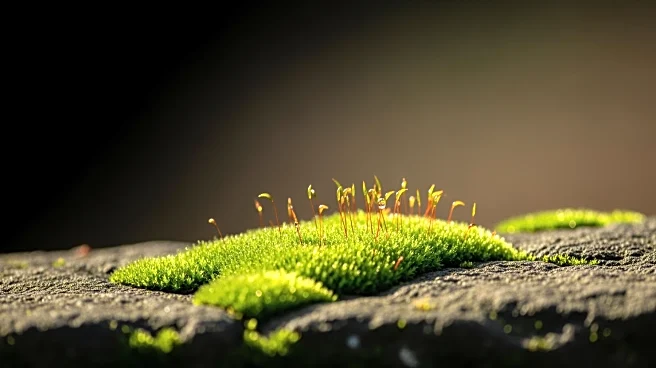What's Happening?
Researchers from Hokkaido University in Japan conducted an experiment by exposing moss spores to the harsh environment of space for nine months aboard the International Space Station (ISS). The study revealed
that the moss spores retained their vitality despite direct exposure to space conditions, including vacuum, microgravity, and ultraviolet radiation. The spores were affixed to the exterior of the ISS and returned to Earth, where they demonstrated a high survival rate and ability to germinate. This resilience suggests that life on Earth possesses intrinsic mechanisms to endure space conditions, offering potential for constructing ecosystems in extraterrestrial environments.
Why It's Important?
The findings highlight the remarkable resilience of life forms originating on Earth, which could have significant implications for future space exploration and colonization efforts. Understanding how organisms can survive and thrive in space conditions is crucial for developing sustainable ecosystems on the Moon, Mars, and other celestial bodies. This research could pave the way for new strategies in bioengineering and ecosystem construction in space, potentially supporting long-term human habitation and exploration missions. The study also contributes to the broader understanding of life's adaptability and resilience in extreme environments.
What's Next?
The research team plans to further investigate the mechanisms behind the moss spores' resilience, potentially leading to advancements in space agriculture and ecosystem development. Future experiments may focus on other plant species and their ability to withstand space conditions, expanding the possibilities for extraterrestrial agriculture. The findings could also inform the design of habitats and life support systems for astronauts, enhancing the sustainability of long-duration space missions. Collaboration with international space agencies and research institutions may accelerate the development of technologies for constructing viable ecosystems beyond Earth.
Beyond the Headlines
The study opens new avenues for exploring the potential of using hardy plant species in space exploration, which could lead to innovative solutions for food production and environmental management in space habitats. The resilience of moss spores may inspire research into other extremophiles and their applications in biotechnology and space exploration. Additionally, the research underscores the importance of interdisciplinary collaboration in advancing our understanding of life sciences and space technology, potentially leading to breakthroughs in both fields.









